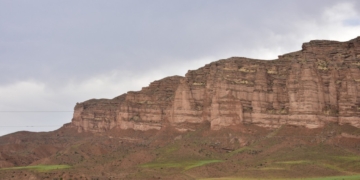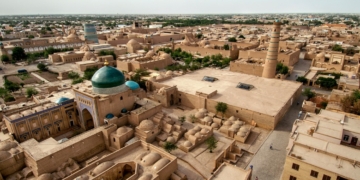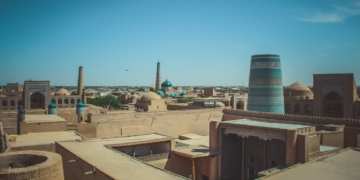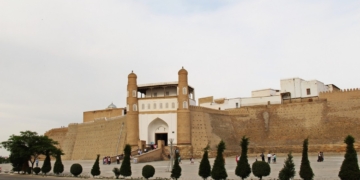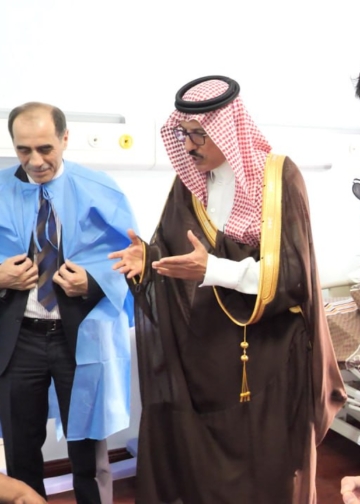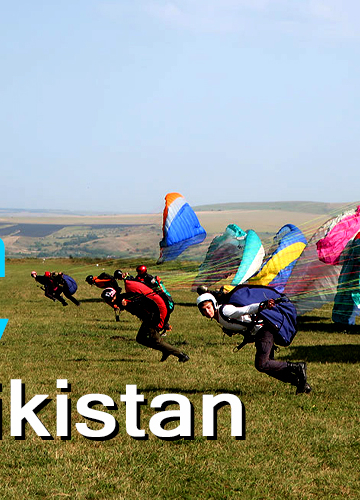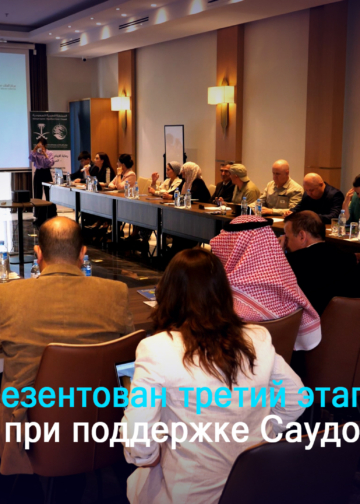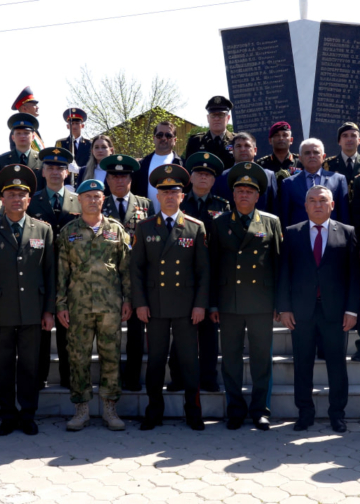id: 245142
date: 1/25/2010 6:25
refid: 10DUSHANBE104
origin: Embassy Dushanbe
classification: UNCLASSIFIED
destination: 09STATE124006
header:
VZCZCXRO6435
RR RUEHLN RUEHSK RUEHVK RUEHYG
DE RUEHDBU #0104/01 0250625
ZNR UUUUU ZZH
R 250625Z JAN 10
FM AMEMBASSY DUSHANBE
TO RUEHC/SECSTATE WASHDC 1163
INFO RUCPDOC/USDOC WASHINGTON DC
RUCPCIM/CIMS NTDB WASHDC
RUCNCIS/CIS COLLECTIVE
RUEHIL/AMEMBASSY ISLAMABAD 0231
RUEHBUL/AMEMBASSY KABUL 0397
RUEHBJ/AMEMBASSY BEIJING 0146
RUEAIIA/CIA WASHDC
RUCPDOC/DEPT OF COMMERCE WASHINGTON DC
RUEATRS/DEPT OF TREASURY WASHINGTON DC
RHEHAAA/NSC WASHINGTON DC
RUEHDBU/AMEMBASSY DUSHANBE 2558
—————— header ends —————-
UNCLAS SECTION 01 OF 10 DUSHANBE 000104
SIPDIS
DEPARTMENT FOR EB/IFD/OIA
E.O. 12958: N/A
TAGS: EINV, EFIN, ETRD, ELAB, KTDB, OPIC, PGOV, USTR, TI
SUBJECT: TAJIKISTAN: 2010 INVESTMENT CLIMATE STATEMENT
REF: 09 STATE 124006
DUSHANBE 00000104 001.2 OF 010
Tajikistan presents selected opportunities for investors who are
willing to put significant research and effort into market
development. The poorest of the
former Soviet republics,
Tajikistan lags economically behind most of its neighbors. The
Tajik government relies largely on foreign state-led investment
and loans from China, Russia, Kazakhstan and Iran, as well as
assistance from international financial institutions, for major
infrastructure projects. The
Government has shown interest in
seeing broader foreign investment, but has a poor record
implementing the reforms necessary to attract investors from
abroad. There have been some
positive steps over the past year,
for instance the creation of a single window for business
registrations and simplification of the regulatory environment.
At the same time, however, Tajikistan’s tax code remains
byzantine, its legislation is confusing, and, more than anything
else, its officials remained steeped in a culture of corruption.
Even where the legal structure is
designed to attract
investment, the actual practice of the authorities discourages
investors. Until Tajikistan
successfully changes such
behaviors, it will not attract or support significant growth in
foreign direct investment.
OPENNESS TO FOREIGN INVESTMENT
Tajikistan mostly courts state-led investment from the country’s
perceived geopolitical friends rather than making conditions
favorable to private investors from abroad. The government
burdens the private sector with unnecessary costs and creates
substantial uncertainty and risk through non-transparent
practices and barriers to competition.
Accordingly, the
principal investors in recent years have been governments with
geopolitical interests in the area, especially Russia, China,
and Iran. As a result of the
world financial crisis, however,
non-state foreign direct investment (FDI) from these three
countries amounted to only $22.4 million in the first 9 months
of 2009, compared to over $300 million during the equivalent
period in 2008. Foreign direct
investment from other countries
totaled $48.3 million during the same period, a third of the
2008 figure.
President Rahmon has made numerous public and private statements
calling for increased foreign investment, particularly in
hydropower. But the government’s
recent promise to finance its
largest hydro project, Roghun using only domestic financing has
disoriented potential investors.
If recent efforts to improve the business climate are
implemented and sustained, the picture may slowly change.
Provided conditions are right, opportunities for investment
exist in hydropower, construction, food processing, textile, and
consumer goods, as well as natural resource extraction.
According to the 2007 Investment Law, foreign investments can be
made by:
— Owning a share in existing companies, either jointly with
other Tajik companies or Tajik citizens;
— Creating fully foreign-owned companies under the laws of
Tajikistan;
— Acquiring assets, including shares and other securities;
— Acquiring the right for use of land and other mineral
resources, as well as exercising other property rights either
independently or shared with other Tajik companies and citizens
of Tajikistan;
— Concluding agreements with legal entities and citizens of
Tajikistan providing for other forms of foreign investment
activity.
The judicial system recognizes sanctity of contracts in
principal; however contract enforcement is poor, due in part to
inadequate legal awareness and the court system’s lack of
independence. While Tajikistan is
party to a number of
arbitration agreements and conventions, it does not have its own
internationally recognized arbitration system. The courts do
not always respect or uphold international arbitration rulings.
According to the Civil Code (Article 1) there is no legal
discrimination against foreign companies and entities.
Practically all of Tajikistan’s international agreements have a
provision for most favored nation status.
DUSHANBE 00000104 002.2 OF 010
In July 2009 a «single-window» business registration system
took
effect, which applies to both foreign and domestic applicants.
The old system required applicants to register with multiple
government agencies with a series of confusing requirements,
virtually guaranteeing that extra payments would have to be made
to streamline the often lengthy process.
Under the new system,
applicants pay a fixed fee at the Tax Committee and receive
permission within five working days.
While some glitches
remain, including officials loath to give up their power, by
most accounts the system is a great improvement over previous
practice. This and several other
reforms targeted at opening,
maintaining, and closing a business were designed to improve
Tajikistan’s position on the World Bank’s «Doing Business»
rankings. On the strength of its
initial reforms, Tajikistan
moved up 12 places in the most recent rankings.
In other areas, however, improvements have yet to emerge.
Tajikistan’s State Committee on Investments and State Property,
created in 2006 to assist investors, so far has done little to
fulfill its mission. Plans to
create a website for foreign
investors seeking information on opportunities in Tajikistan
have not gotten off the ground. There are no established
criteria for screening investment proposals, and potential
investors go through a lengthy screening process by all
(potentially) concerned government agencies, rather than working
with a single investment promotion agency.
The government has embarked on an on-again, off-again process of
privatizing state-owned companies.
Privatization of small and
medium enterprises is mostly complete, while the process
continues for larger concerns.
Although there are no limits on
foreign participation, in many circumstances non-transparent
decisions are made that favor investors with connections to the
existing power structure. Some of
the largest enterprises,
belonging to Tajikistan’s transportation, infrastructure and
electricity distribution and maintenance sectors, will remain
government-owned for the foreseeable future.
There is no legally-sanctioned discrimination against foreign
investors at the time of the initial investment or after the
investment is made. Current
investment law and tax code provide
for incentives, including a waiver on taxation on initial
investment and VAT-free importation of some industrial
equipment. Companies may have a
difficult time realizing these
benefits, however, due to poor implementation of tax regulations
and/or corrupt tax authorities.
The onus of proving that an
investment qualifies for the benefits is on the investor, and
Tajik authorities are often skeptical.
The government also
attempts to increase revenue by taxing profitable companies more
aggressively. The fact that the
tax burden is placed on
companies that have a greater degree of compliance with
regulations results in distorted competition. To avoid
predatory behavior by the ruling elite, some foreign investors
find it easier — some say necessary — to establish joint
ventures with well-connected officials, including the
President’s family.
Legally, foreign companies are treated the same as domestic
companies in obtaining licenses, approvals, and procurements.
They may find, however, that Tajik authorities demand higher
official and unofficial payments from them. There are no laws
or regulations authorizing private firms to limit or prohibit
foreign investment, participation, or control.
According to some sources, even well-meaning companies are
forced to violate some tax legislation, since internal
contradictions and draconian rules make it impossible to abide
by all existing rules. Beginning
in December 2009 the
government began forcing individuals and enterprises across the
country to make sizable «voluntary» contributions to the
Roghun
hydroelectric dam construction project.
Those refusing to pay
have received threats of varying severity.
Although the Tajik economy began growing rapidly at 8-10% per
year in 2000, many economic indicators remain below the
benchmarks of 1991, when Tajikistan became independent.
Tajikistan’s gross domestic product (GDP) grew 7.9% in 2008, but
slowed to an estimated 2% in 2009, or $4.58 billion, due to the
world financial crisis. Some
earlier crisis-fueled nervousness
among depositors has calmed, and bank deposits (legal entities
DUSHANBE 00000104 003.2 OF 010
and personal) began increasing in late 2009 after falling off
over 2008. The informal economy
is still quite substantial;
according to some estimates, it may be as high as $2 billion,
over one-third the size of official GDP.
Tajikistan’s banking
sector is relatively undeveloped, and businesses tend to raise
capital through other means, including selling off assets and
borrowing from other companies or individuals.
The government does not impose geographic restrictions on
business operations, but topography (93% of the country is
mountainous), poor infrastructure, and lack of adequate energy
pose their own restrictions.
Roads in Dushanbe and Khujand are
poor even by Central Asian standards, and roads outside of major
towns are often unpaved and poorly maintained. A few major
routes, such as those between Dushanbe and Khujand, Dushanbe and
Gharm, and Dushanbe and the Afghan border, are being renovated
with foreign financing. Weather
also impacts commerce; overland
travel to parts of the country (e.g., the Gorno-Badakhshan
Autonomous Oblast) is difficult if not impossible in the winter
and spring. Electricity
production is well short of demand,
especially in the winter. For
three to six months of the year,
most parts of the country outside of Dushanbe receive a few
hours of power each day. Overland
import/export requires
patience and ingenuity as customs agents at borders and internal
checkpoints frequently seek bribes to allow passage.
Tajikistan’s rankings on a few selected indices are as follows:
INDEX
SCORE RANKING YEAR
(max) (out of)
——————————————— ————
Transparency International
Corruption Perceptions Index 2.0
(10) 158 (180) 2009
Heritage Foundation Index
of Economic Freedom 53.0
(100) 128 (179) 2010
World Bank Doing
Business Ranking
n/a 152 (183) 2010
Tajikistan’s rankings on selected Millennium Challenge
Corporation (MCC) Indices for fiscal year 2010 are as follows:
MCC INDEX
SCORE PERCENTILE
——————————————— —
Government Effectiveness
-0.09 39%
Rule of Law
-0.22 29%
Control of Corruption
-0.21 32%
Fiscal Policy -3.6 19%
Trade Policy
82.5 95%
Regulatory Quality
-0.34 32%
Business Start-Up
0.958 78%
Land Rights and Access
0.559 33%
Natural Resource Management
70.88 72%
CONVERSION AND TRANSFER POLICIES
Tajikistan does not restrict conversion or transfer of funds up
to $100,000; higher amounts are subject to approval by the
National Bank of Tajikistan.
However, an underdeveloped banking
infrastructure, with strict government controls and limited
capital, presents obstacles for investors in finding local
sources of financing. Although
legal, it is often difficult in
practice to conduct large currency transactions, due to the
limited amount of foreign currency available in the domestic
financial market. Investors are
free to import currency. The
minimum regulatory capital for commercials banks is $5 million.
All banking institutions (13 commercial banks, including three
branches of foreign banks) meet this requirement.
EXPROPRIATION AND COMPENSATION
The Law on Investments details the types of actions that can be
taken with regard to expropriation of property. There have been
no known cases where foreign commercial entities have had their
property seized, but there have been several recent cases of
potential or actual state expropriation of other privately-owned
property under dubious circumstances.
In one case, that of a
foreign-owned church, the rationale appears to be political.
DUSHANBE 00000104 004.2 OF 010
While the Law states that investors are to be reimbursed for
expropriated property, actual compensation may be minimal.
DISPUTE SETTLEMENT
In official pronouncements, the Tajik government values the rule
of law; in practice, however, it has not demonstrated a clear
understanding of its importance to investors. The international
community, including the United States, has encouraged
Tajikistan to improve its legal system, with mixed results.
Well-written laws have been passed, but implementation and
consistent interpretation lag behind.
Few people, especially
small business owners, are aware of their rights and
responsibilities. Tajikistan’s
weak judiciary is ill-equipped
to defend the interests of investors.
Despite this, foreign investors have found some relief in
disputes involving Tajik entities.
In 2007, a trade dispute
involving a U.S. company and a
state-owned enterprise was
resolved by the Tajik government paying off the full amount of
the claim. A Norwegian company
successfully settled a suit in
foreign arbitration. So far,
though, such cases have been very
few.
Tajikistan has well-written commercial and bankruptcy laws. The
country’s contract law is modeled on European legislation.
These laws are regulated under the country’s Civil Code;
however, they are not always enforced in the courts.
Tajikistan is starting to develop an Institute of International
Arbitration. It has signed
bilateral agreements with several
countries on arbitration and investment disputes, but these
agreements are not always enforced or recognized. Tajikistan
does not have a bilateral agreement with the United States.
In 1993 Tajikistan became a member of the International
Association on Investment Guarantees as well as the
International Center for the Settlement of Investment Disputes
(Washington Convention).
Tajikistan is not a party to the New
York Convention of 1958 on the Recognition and Enforcement of
Foreign Arbitral Awards.
PERFORMANCE REQUIREMENTS/INCENTIVES
Current legislation provides the same tax and customs incentives
to local and foreign investors.
In practice, however, companies
with close connections to the government get preferential
treatment. The government does
not formally impose performance
requirements as a condition for establishing, maintaining, or
expanding investment. While there
is no requirement to «buy
locally,» it is encouraged.
RIGHT TO PRIVATE OWNERSHIP AND ESTABLISHMENT
The government wants to encourage business development but faces
major obstacles, including its own poor management and corrupt
practices. In principle, private
entities may establish and own
businesses and engage in almost all forms of remunerative
activity. Foreign entities may
establish, acquire, and dispose
of interests in business enterprises.
In practice, however, the
old Soviet mentality still prevails.
Government inspectors
often operate on the principle that activities are not permitted
unless they are expressly allowed (or unless he is remunerated
for adopting a more flexible interpretation), and since laws are
neither published nor uniformly applied and interpreted,
businesspeople often find Tajikistan frustrating.
There are other unofficial barriers.
Informal networks of
clan-based, interrelated suppliers often exist, forcing would-be
investors to «buy in» to the system, hindering competition and
sometimes constraining new investors from fully participating.
The government faces a daunting task to improve the operating
environment. Restructuring must
be implemented at each
sub-governmental level for each area of reform. While the Tajik
government has begun reviewing these weaknesses and is making
some improvements, the business environment remains difficult.
PROTECTION OF PROPERTY RIGHTS
Undeveloped legal avenues for dispute resolution create a weak
DUSHANBE 00000104 005.2 OF 010
environment for property rights protection in Tajikistan.
According to Tajik law all land belongs to the state, but
foreign investors can acquire up to 50-year land-use rights.
There are no legal limitations on foreign ownership or control
of other property, but there are significant restrictions on
using land-use rights as collateral.
A revised Land Code
submitted to the government in 2008 providing for the sale of
land-use rights, was changed at the last minute by an unknown
official, leaving the issue confused.
Efforts are underway to
introduce new, clearer legislation, but it remains a thorny
issue. The government adopted
mortgage legislation in December
2007 which may allow parties to use property as collateral. In
practice land use continues as before, however, because no legal
mechanisms and procedures were developed to implement these new
laws.
When secured interests in property do exist, enforcement remains
an issue. Investors should be
aware that establishing title may
be a more involved process than in western countries, since
ownership is often unclear. A
system to record, protect and
facilitate acquisition and disposition of property exists but
needs improvement. Most banks
have reduced lending as a result
of the financial crisis; in the past mortgage rates have been
very high. Finally, the legal
system is not adept at quickly
and efficiently settling disputes.
Tajikistan affords few protections for patents, copyrights,
trademarks and other intellectual property. However, the United
States is working with the government of Tajikistan to help
revise intellectual property rights legislation. Tajikistan has
taken significant recent steps to protect intellectual property,
including an amendment to the Law on Intellectual Property to
protect copyright owners from Internet theft, a new office
dealing with intellectual property violations in the Ministry of
Interior, and a parliamentary agreement to join the Rome
Convention for the protection of intellectual property.
TRANSPARENCY OF THE REGULATORY SYSTEM
Cronyism, nepotism and corruption create a business environment
that favors those with connections to the government.
Tajikistan’s regulatory system lacks transparency and poses a
serious impediment to businesses’ operations. Regulators and
officials often apply laws arbitrarily, and are unable or
unwilling to make decisions without a supervisor’s permission,
leading to lengthy delays.
Executive documents — i.e.,
presidential decrees, laws, government orders, instructions,
ministerial memos, and regulations — are often inaccessible,
leaving businesses and investors in the dark about the rules.
Each ministry has its own set of normative acts that are not
published and may contradict law or normative acts of other
ministries.
Tajikistan’s legislation provides for 18 different types of
taxes and numerous ways to calculate them. Not only are the
regulations complicated, but the inconsistency with which they
are applied impedes the development of small and medium
enterprises. The tax code came
into effect November 3, 2004,
and was amended most recently on December 3, 2009. In mid-2008
the government of Tajikistan declared a two-year moratorium on
tax inspections, which government officials had used routinely
to extort money from business owners.
An inspections law signed in 2006 and promoted extensively by
the International Finance Corporation has reduced the practice
of government agencies shaking down enterprises for bribes, but
reports of such incidents are still widespread. Tajikistan is
working towards international accounting norms, but these are
not yet implemented.
Tajikstandart, the government agency responsible for certifying
goods and services, calibrating and accrediting testing
laboratories, and supervising compliance with state standards,
does not publish its fees for licenses and certificates or its
regulatory requirements. As a
result, businesses are vulnerable
to individual inspectors’ whims.
So far no concrete steps have
been taken to create proposed «one-stop shops» for certifying
businesses in various categories.
Structural problems aside, the Tajik government needs to convey
DUSHANBE 00000104 006.2 OF 010
its goals and procedures to the inspectors and other government
employees who interact with businesses daily. As long as
government inspectors treat their positions as a license for
rent-seeking — and as long as the government tolerates it —
Tajikistan will remain a difficult place for investors.
EFFICIENT CAPITAL MARKETS AND PORTFOLIO INVESTMENT
Tajikistan’s nascent banking sector faces numerous challenges:
insufficient capital, limited banking services, mistrust and
fallout from earlier banking system crises. The national
currency, the somoni, was introduced in October 2000.
The total value of regulatory capital of all commercial banks in
Tajikistan as of October 2009 is 939.8 million somoni
(approximately $215 million).
Estimated net worth of the top
three commercial banks is as follows:
— Orion Bank: 300 million somoni ($68.6 million)
— TojikSodirot Bank: 100 million somoni ($22.8 million)
— AgroInvest Bank: 185 million somoni ($42.3 million)
As of October 1, 2009, there are 13 banks, 6 credit societies, 1
non-banking financial organization and 114 micro finance
organizations in Tajikistan, as well as the National Bank of
Tajikistan. Nine banks are joint
stock companies, one is
state-owned, and three are branches of foreign banks: Tijorat
(Iran), KazCommerceBank (Kazakhstan) and First Micro Finance
Bank of Tajikistan, owned jointly by the Aga Khan Fund for
Economic Development and the International Finance Corporation.
Tajikistan’s ratio of migrant labor remittances to GDP, standing
at 40% in 2009, was among the highest in the world. Over the
course of the year, as many as a million Tajiks working abroad,
primarily in Russia, sent home $1.8 billion through the banking
system. This is a one-third
decline over 2008, due to the
effects of the global financial crisis on the Russian labor
market. Although an ever greater
share of remittances flow
through the banking system, banks have limited success luring
consumers to deposit their funds into savings accounts that
could be used for investment. The
2008 scandal in which the
National Bank misreported loans it had underwritten to cotton
investors did not help, although the International Monetary Fund
reports that the Bank has improved its accounting and
cooperation.
The limited lending has been at very high interest rates.
Before the financial crisis, with inflation running about 10%,
local commercial banks were issuing 12-month loans worth more
than $100,000 at 24% APR, prohibitively expensive for most
customers to develop a new business.
Interest on smaller,
shorter term loans was as high as 36% APR. In addition, banking
officials were known to ask for kickbacks in amounts up to 10%
of the loan they approved. Due to
such high interest rates and
low capital, few investors secure business or personal loans
through banks. In the wake of the
financial crisis banks have
reduced lending due to fears of default.
The government’s plan
to write off over $500 million in agricultural debts may ease
some concerns, but the necessary recapitalization of the
National Bank may add its own problems.
Despite the many
difficulties, Tajik banks remain relatively well capitalized,
with good asset-to-debt ratios.
The private sector has access to micro-credit, commercial
credit, and factoring instruments.
Some banks provide trade
financing services. To reduce
barriers to competition, the
government has paved the way for non-bank financial
organizations and commercial microfinance. The government
recently took steps toward creating a credit bureau, though its
realization remains several years off.
Much work is needed to
strengthen creditor and shareholder rights. Performance on
micro-credit loans exceeds 90%; business loans also perform
well. Checking accounts exist but
are not widely used due to
strict cash withdrawal procedures.
There are no known cross-shareholding or stable shareholder
arrangements. Hostile takeovers
are rare, though there are no
written protections against them.
State authorities selectively
apply laws and regulations to take over or completely shut down
companies. A stock market in
Tajikistan was founded in 1994,
but foundered due to a lack of new financial instruments. In
DUSHANBE 00000104 007.2 OF 010
2000, the government established a Central Share Registry (CSR)
in the Ministry of Finance to record, monitor, and facilitate
share purchases and sales for more than 400 stock companies.
The government issues treasury bills to cover budget deficits,
using local banks to cover the loans.
The government recently
has begun selling shares in the Roghun hydroelectric project
directly to the population. Since
by most accounts Tajiks are
forced or intimidated into buying the shares, and little
information about shareholder rights or maintenance of funds has
been released, this represents a step backward rather than
forward for the country’s financial system.
More information about the National Bank of Tajikistan is
available on its website: http://www.nbt.tj.
COMPETITION FROM STATE-OWNED ENTERPRISES
While the government of Tajikistan has sold many formerly
state-owned small and medium enterprises, several large
enterprises remain under state control.
These include the
national electrical grid operator (Barqi Tojik), the natural gas
operator (Tojikgaz), and the Talco Aluminum Company,
Tajikistan’s largest enterprise.
As a general rule, private
companies cannot hope to compete with State-Owned Enterprises
(SOEs) unless they have good connections with the government.
This has less to do with any explicit policy favoring SOEs than
with the fact that Tajikistan’s ruling elite often profit
directly from the SOEs.
SOEs are not run transparently.
Their budgets are not publicly
known, although efforts are underway to make them more
transparent.
CORPORATE SOCIAL RESPONSIBILITY
There is little awareness of corporate social responsibility in
the western sense in Tajikistan.
Many, if not most,
corporations have contributed to the Roghun campaign (see above,
under Efficient Capital Markets), but many of these
contributions were coerced.
Corporations do engage in voluntary
community assistance, on an ad hoc basis.
POLITICAL VIOLENCE
Political violence in Tajikistan is minimal. The security
situation has stabilized significantly since the Civil War ended
in 1997. All factions signed a
peace agreement, and the
government incorporated members of the opposition into a
multi-party system — although President Rahmon has since
steadily removed opposition figures from government positions to
consolidate his power. The Tajik
government has worked to
minimize the impact of political discord on foreign investors.
With the civil war in recent memory, the people of Tajikistan
are keen to maintain peace, a factor sometimes adduced to
explain the population’s acceptance of the government’s
egregious corruption.
Tajikistan sometimes serves as a transit country for extremist
terrorist groups. In mid-2009
there was some sporadic
anti-regime activity in the central part of the country, but
this activity appears to have ceased.
Narcotics trafficking
from Afghanistan is significant.
CORRUPTION
As in previous years, Tajikistan ranked very low on the 2009
Transparency International Corruption Perceptions Index. It
scored 2.0 out of 10, placing it 158 on a list of 180 countries
surveyed. Anemic anti-corruption
efforts from the Tajik
government have proven ineffective — indeed, some
anti-corruption units are ironically known to be particularly
corrupt. Extremely low official
salaries do not help, since
they force many officials to look for means to make ends meet.
Buying a government position is common, and people frequently
bribe superiors for promotions.
Cultural expectations play a
role as well: people are expected to share their good fortune
with superiors and extended family, and nepotism or other favors
for clan-members, extended family, or superiors are commonplace.
As noted throughout this report, endemic corruption stifles
business by local and international investors. Officials at any
DUSHANBE 00000104 008.2 OF 010
number of agencies expect payoffs for opening and running a
business. Although a signatory to
the OECD Convention on
Combating Bribery and the United Nations Convention against
Corruption, corrupt practices are deeply embedded in every
aspect of commerce, and calculating the actual cost is
difficult. In 2007, President
Rahmon created a new Agency to
Fight Corruption and Economic Crimes, reporting directly to the
Presidential Administration, to monitor fiscal activity of
individuals, banks, and corporations.
This agency has still
done little to fight corruption within government ranks,
focusing instead on individual and corporate malfeasance and
especially on the financially vulnerable population, including
teachers, doctors, and others with low salaries.
BILATERAL INVESTMENT AGREEMENTS AND DOUBLE TAX TREATIES
Agreements on avoiding double taxation exist between Tajikistan
and Russia, Belarus, Ukraine, Azerbaijan, Turkey, and some other
countries, but not between Tajikistan and the United States.
The Trade Investment Framework Agreement between the five
Central Asian states and the United States is under development.
Tajikistan is a member of the
EURASEC trade organization, which
provides loose regulation of trade among Russia, Belarus,
Kazakhstan, Kyrgyzstan, and Tajikistan.
Tajikistan is also a
member of the Shanghai Cooperation Organization.
OPIC AND OTHER INVESTMENT INSURANCE PROGRAMS
Tajikistan is open to insurance and financing programs of the
Overseas Private Investments Corporation (OPIC). Thus far,
however, OPIC’s involvement in investments in Tajikistan has
been limited to a beverage bottling project. Tajikistan’s
relative macroeconomic stability and a growing economy provide
for opportunities for OPIC insurance and financing.
The Export-Import Bank of the U.S.
considers projects on a
case-by-case basis, although Tajikistan hat not qualified for
its programs. Opportunities exist
in infrastructure projects,
aircraft export financing, agricultural machinery, and food
processing.
LABOR
Due to a crumbling and corrupt education system, Tajikistan’s
labor force is becoming increasingly less well-trained, and is
ill-equipped to provide Western standards of customer service
and business. International
businesses and NGOs lament the
small pool of qualified office staff for their organizations.
Some have brought in Chinese or Indian laborers for construction
projects. Corruption in secondary
schools and universities
means degrees do not reflect real professional training or
competency. Although education is
compulsory, many students
must work to support their families.
Brain drain is a problem
for domestic employers, since many Tajiks with advanced skills
emigrate to find better opportunities.
The official unemployment rate in Tajikistan is 9.5%, but the
actual rate may be up to 30% nationwide, with some areas much
higher. These rates are offset by
the estimated one million
labor migrants working abroad, almost all of them in Russia.
While remittances from these migrants have dropped 33% compared
to last year, most migrants appear to be staying abroad, hoping
for better times. It is not hard
to see why: the average
monthly salary in Tajikistan is 311.55 somoni ($71.20), and
inflation outstrips wage growth.
According to the World Bank,
53% of the population lives below the poverty line and an
additional 17% are considered «desperately poor.» Experts say
the drop in remittances is likely to increase these percentages
significantly. Remittances have a
profound effect on economic
stability in Tajikistan, paying for a high percentage of its
growing appetite for imports, particularly foreign vehicles,
construction materials, food, and consumer goods.
Tajikistan’s high birth rate means that 50% of the population is
less than 25 years old; if the trend continues, unemployment
will increase.
Nepotism and corruption play a large role in the labor market.
Many of the higher prestige or more lucrative jobs require a
«buy-in,» as well as continuing payments to supervisors,
leading
the job-holder to look for ways to pay back that sum by seeking
DUSHANBE 00000104 009.2 OF 010
bribes or other corrupt activity.
The labor market favors employers.
Although technically the
majority of workers are unionized, most are not aware of their
rights and few unions have the will or know-how to effectively
advocate for workers’ rights.
Unions are tightly controlled by
the government.
Tajikistan is a party to 44 international labor conventions. In
June 2005, it signed the Worst Forms of Child Labor Convention,
dedicated to eliminating child labor and protecting children and
young people. Despite this, in
past years schoolchildren and
university students have frequently been forced by officials to
pick cotton, providing one of the country’s main sources of
income. According to most reports
students were not sent into
the fields during the 2009 harvest, although some government
employees were furloughed to pick cotton. The International
Labor Organization notes that Tajikistan has not submitted
reports required by the Convention.
FOREIGN TRADE ZONES/FREE TRADE ZONES
Tajikistan is a landlocked country whose neighbors demonstrate
varying abilities and interest in trade.
Most of Tajikistan’s
rail and road links pass through Uzbekistan, whose relations
have soured considerably with Tajikistan, making transit of
goods through Uzbek territory difficult.
For example, in
October 2007 Uzbekistan decreed that traders must pay the full
value of excise goods passing through its territory as a customs
deposit — a fee that is then difficult to get back. There are
frequent reports of railway carriages bound for Tajikistan that
are held up for weeks or months in Uzbek territory for no
apparent reason. There are no
commercial flights between
Uzbekistan and Tajikistan. To
overcome this dependence on
Uzbekistan, Tajikistan has sought to open alternative transit
routes to the north, via Kyrgyzstan and Kazakhstan; the south,
via Afghanistan, Pakistan, and Iran; and the east, via China.
The opening of the border crossing at Kulma, in eastern
Tajikistan, has facilitated increased trade with China, although
the 4,600-meter pass is open only intermittently due to extreme
weather. Passing over the some of
the roughest and least
developed territory in Asia, even when open, this route is
difficult and time-consuming, and without major infrastructure
improvements, it will have limited impact on trade. Several
international financial institutions, along with the governments
of China and Iran, have projects to improve the road system.
The Asian Development Bank (ADB) is working on the road from
Dushanbe northeast to Osh, Kyrgyzstan, and ultimately to China.
The Chinese government is funding the road from Dushanbe to
Tajikistan’s second-largest city, Khujand. The Iranian
government is helping to construct the Anzob tunnel to
facilitate year-round travel on that route. There is also
strong interest to improve links to the south. The United
States government built a $39 million bridge linking Tajikistan
and Afghanistan, connected to a new road financed by the
Japanese.
Though the Law on Free Trade Zones was enacted in 2004, only in
2009 has the government made progress on implementation, with
the establishment — at least on paper — of the Soghd Free
Economic Zone in the northern city of Khujand and the Pyanj Free
Economic Zone near the U.S.-funded bridge across the Pyanj River
on Tajik-Afghan border. Two
additional zones in the east and
south are under consideration.
The zones are designed to
attract foreign capital, investment, and technology, and to
develop Tajikistan’s economic potential by establishing minimal
taxes, low land leasing rates, low duties on imports and
exports, and special visa rules.
So far, however, no companies,
foreign or domestic, have located to the free economic zones
(although the Sughd zone incorporates 37 enterprises that
already existed on its territory).
WTO accession negotiations were launched in 2004 by the Tajik
government with assistance from the U.S.
and other donors. In
January 2008, a group of WTO experts met with President Rahmon
in Dushanbe, who reconfirmed his intention to lead the country
into the WTO. Some Tajik experts
believe it will take at least
five more years before that goal is realized, however. The last
negotiations on Tajikistan’s accession were conducted in Geneva
in October 2009.
DUSHANBE 00000104 010.2 OF 010
FOREIGN DIRECT INVESTMENT STATISTICS
According to data from the State Statistical Committee, total
foreign direct investment (FDI) in the first nine months of 2009
was $70.7 million. Of this, $43.4
million came from former
Soviet states (mostly Kazakhstan, with investments of $26.1
million). Total FDI in the same
period in 2008 was $462
million, indicating the financial crisis took a heavy toll.
Between 1997 and 2009, total FDI amounted to $1.3 billion.
In the first nine months of 2009, the FDI to GDP ratio equaled
0.5%, down from 9% in 2008.
According to Tajikistan’s official state statistics, the largest
foreign direct investors for the first nine months of 2009 were:
Russia — $17.2 million
Cyprus — $0.14 million
United States — $0.08 million
Great Britain — $10 million
Switzerland — $0.16 million
Kazakhstan — $26.1 million
China — $3.3 million
Foreign direct investment by sector over that period was as
follows:
Energy: $10 million
Communications: $14.8 million
Banking: $26.4 million
Gold mining: $3.1 million
Agriculture: $0.15 million
(The government’s definition of investment for the purposes of
these statistics is not always clear.
Several major foreign
direct investors from Cyprus and the United States, for example,
are Tajik-held companies registered offshore.)
These figures do not include state-led investment projects, such
as the Chinese and Iranian roadwork noted above. The Chinese
have invested over $1 billion in Tajik infrastructure projects,
most of it in the form of preferential loans. Russia has
invested nearly $200 million in the Sangtuda-1 hydroelectric
project (completed in 2009), while Iran is developing the
Sangtuda-2 project just downstream.
In terms of Tajik foreign investment abroad, Tajikistan has
signed an agreement with Iran to modernize the Iranian port in
Bandar-Abbas in order to accelerate shipments of aluminum from
and alumina to the Talco plant in Tursunzade, Tajikistan. Due
to the world financial crisis little has been done so far,
however.
GROSS
=======================CABLE ENDS============================
id: 245217
date: 1/25/2010 11:55
refid: 10DUSHANBE107
origin: Embassy Dushanbe
classification: CONFIDENTIAL
destination: 09DUSHANBE1364|10DUSHANBE52
header:
VZCZCXRO6762
RR RUEHDBU
DE RUEHDBU #0107/01 0251155
ZNY CCCCC ZZH
R 251155Z JAN 10
FM AMEMBASSY DUSHANBE
TO RUEHC/SECSTATE WASHDC 1174
INFO RHMFISS/CDR USCENTCOM MACDILL AFB FL
RUCNCIS/CIS COLLECTIVE
RUEHBUL/AMEMBASSY KABUL 0407
RUEHBJ/AMEMBASSY BEIJING 0156
RUEHDBU/AMEMBASSY DUSHANBE 2571
—————— header ends —————-
C O N F I D E N T I A L SECTION 01 OF 02 DUSHANBE 000107
SIPDIS
E.O. 12958: DECL: 1/25/2020
TAGS: ELTN, PREL, ETRD, UZ, TI
SUBJECT: UZBEK-TAJIK TRANSPORT — OFF THE RAILS
REF: A: 09 DUSHANBE 1364; B: DUSHANBE 052
CLASSIFIED BY: Ken Gross, Ambassador, EXEC, DoS.
REASON: 1.4 (b), (d)
1. (C) SUMMARY: A tit-for-tat
over rail shipments highlights
the Tajik rail system’s dependence on Uzbekistan for its
international transport. After
Uzbekistan delayed Tajik
railcars carrying construction materials for hydroelectric
projects, Tajikistan responded by holding up Uzbek trains.
Tashkent upped the ante by prohibiting its trains from carrying
passengers and most commercial goods across Tajikistan’s
northern Sughd Oblast and by delaying transit of hundreds of
Tajik railcars and trucks. Both
governments released all
railcars and trucks by early January, but the Uzbek ban on most
Uzbek rail transport through Sughd continues. Tajik officials
played down the dispute, saying it stemmed from logistical, not
political, problems. Foreign
Minister Zarifi used this quarrel
to underscore Tajikistan’s intent to request funding for new
Tajik transport routes that do not cross Uzbek territory at the
January 28 London conference on Afghanistan. END COMMENT
2. (SBU) As of January 1, 2010, the Uzbek government, per decree
by President Islam Karimov, prohibited shipment of passengers
and goods, except for fuel and other strategic materials, across
the Sughd Province of Tajikistan.
The railroad through Sughd,
which is surrounded by Uzbek territory on three sides, is the
most direct route from Central Uzbekistan to the Ferghana Valley
and Osh, Kyrgyzstan, and had been used heavily before the decree
took effect. The January 1 decree
requires Uzbek trains
carrying non-strategic goods to make a long detour to the north,
which dead ends at the Uzbek city of Angren. Goods must then be
transported by road to Kokand in the Ferghana Valley and
re-loaded onto the old rail line.
3. (C) The Uzbek decision to end shipments across Sughd follows
a Tajik-Uzbek dispute over rail shipments that began in November
2009. In November, after the
Tajik government began a major,
nationalism-fueled campaign to build the Roghun hydroelectric
dam (reftels), Uzbek officials held up 20 to 30 Tajik railcars
carrying Roghun construction materials through Uzbek territory,
according to an employee of Global Link transit company which
ships Embassy materials by land and rail. The Tajik government
responded by holding an equal number of Uzbek train cars
transiting its Sughd Province. The Uzbek government then
delayed transit of hundreds more Tajik railcars and trucks.
National rail companies supply locomotives to transport all
railcars transiting their respective territories, giving them
the ability to control the movement of foreign cargo railcars.
4. (SBU) Deputy Head of Tajik Railways Vladimir Chetkalov said
on January 21 that the problem was resolved and Uzbekistan
released all Tajik railcars and trucks.
He noted that
Uzbekistan hurt its own citizens and businessmen with its order
to end rail transport through Sughd Oblast since shipping costs
and travel times between Tashkent and the Ferghana Valley would
increase for Uzbeks. «We can
transport goods by rail at $4.60 a
ton. How can they transport goods
that cheaply by road from
Angren?» The Uzbek decision
also hurts Tajik National Railways
because it will no longer earn transport fees for pulling Uzbek
railcars across Sughd. On the
Northern Distribution Network,
Chetkalov complained that the international coalition in
Afghanistan has underused the Tajik rail system and not sent any
materials by rail across Tajik territory to coalition forces in
Afghanistan.
5. (SBU) At a January 18 press conference, Foreign Minister
Zarifi said he would request funding for building a railroad
linking Turkmenistan, Tajikistan, and Afghanistan (at
Mazar-i-Sharif) at the January 28 London Conference on
Afghanistan. Zarifi said
Tajikistan’s unreliable rail links to
its trading partners impeded progress on its economic and
foreign policy priorities, such as joining the
Russia/Belarus/Kazakhstan Customs Union.
Zarifi declared that
Tajikistan «never employed the politics of confrontation toward
neighboring countries on any issues, including hydroelectric
power,» possibly forgetting Tajikistan’s autumn 2009 threats to
fill its water reservoirs during the summer rather than release
water to downstream Uzbekistan for irrigation.
6. (C) The government has played down the political element of
the railcar dispute. In a January
20 meeting with Ambassador
Gross, Zarifi confirmed that Uzbekistan had released all Tajik
railcars and said the problem had been «only 10% political»
and
DUSHANBE 00000107 002 OF 002
resulted mainly from shortages of locomotives in «upstream» in
Turkmenistan. However, he
admitted the Uzbek government had
singled out Tajik railcars carrying construction materials for
Sangtuda-2 and other hydroelectric dam projects. Railways
Deputy Chetkalov said the Uzbek Embassy explained the back-up as
a result of a logjam up-track in Turkmenistan. Sughd Oblast
Governor Qohir Rasulzoda said in an interview with Ferghana.ru,
that the reason for Uzbekistan’s decision to cut rail links
through Sughd was Uzbekistan’s opposition to Tajik hydroelectric
projects, particularly Roghun.
7. (SBU) COMMENT: This railcar
dispute is only the latest in a
series of mutually destructive actions by the Uzbek and Tajik
governments that hurt Tajikistan more because of its physical
isolation and relatively weaker economic position. Uzbekistan’s
tough visa regime for Tajiks, the absence of flights between
Tashkent and Dushanbe, its withdrawal from the Central Asian
energy grid, and now the severing of most Uzbek rail transit
through Sughd are perceived in Dushanbe as indications that
Uzbekistan seeks to detach its economy and transportation system
from Tajikistan while maintaining its ability to pressure
Dushanbe. Since Tajikistan has
decided to go all out to build
Roghun, Uzbekistan can be expected to employ further tactics to
prevent building materials from reaching Tajikistan. Though the
Tajiks see a solution in donor-funded rail links to
Afghanistan/Turkmenistan, it cannot escape its geographic bond
to Uzbekistan. For its long-term
economic growth,
transportation links, and security, Tajikistan must come to an
understanding with Tashkent on Roghun and a range of other
issues. END COMMENT.
GROSS
=======================CABLE ENDS============================
id: 245425
date: 1/26/2010 3:25
refid: 10DUSHANBE108
origin: Embassy Dushanbe
classification: UNCLASSIFIED//FOR OFFICIAL USE ONLY
destination:
header:
VZCZCXRO7578
PP RUEHLN RUEHSK RUEHVK RUEHYG
DE RUEHDBU #0108/01 0260325
ZNR UUUUU ZZH
P R 260325Z JAN 10
FM AMEMBASSY DUSHANBE
TO RUEHC/SECSTATE WASHDC PRIORITY 1176
INFO RUCNCIS/CIS COLLECTIVE
RUEHBUL/AMEMBASSY KABUL 0409
RUEHDBU/AMEMBASSY DUSHANBE 2573
—————— header ends —————-
UNCLAS SECTION 01 OF 02 DUSHANBE 000108
SENSITIVE
SIPDIS
E.O. 12958: N/A
TAGS: PGOV, PHUM, KDEM, TI
SUBJECT: TAJIK ELECTIONS: RULING
PARTY LEADER PRAISES PRESIDENT
REF: A) 0027; B) 1335
DUSHANBE 00000108 001.2 OF 002
1. (SBU) SUMMARY: Newly appointed
Deputy Chairman of the ruling
People’s Democratic Party of Tajikistan (PDPT), Safar Safarov,
told Ambassador Gross that his party is ready for February 28
parliamentary polls and pledged to run a fair campaign. Safarov
is «ready for debates» but set conditions that participants do
not use «censorable language.»
Safarov said the Tajik people
were united behind President Rahmon, Chairman of the PDPT, and
would vote en masse because of their confidence in the
President’s leadership. The PDPT
nominated high-profile
government officials to run in single-mandate districts and is
poised to maintain its super-majority.
END SUMMART
2. (SBU) In a January 23 meeting, PDPT First Deputy Chairman
Safarov said the party supported Party Chairman President
Rahmon’s pledge to conduct free and fair elections and promised
that there would be «no violations committed by the President’s
party.» Safarov said the
President told him to «Do everything
so that, after the elections, people will continue to look at us
in the same light. We hope that
the people understand us,
believe in us, and have faith in the elections.» The PDPT holds
47 of 63 seats in the Majlisi Namoyandagon, the lower house of
parliament. (Pro-PDPT independent
MPs hold additional seats.)
International and local political observers expect that they
will maintain their large majority in parliament.
3. (SBU) Safarov is focused on electing «professionals» to the
2010 parliament. «As the
President said, the parliament is not
to be a gathering of collective farmers.
Considering the
quality make-up of our candidates, I can say that our candidates
should make it through the difficult test of elections.» The
PDPT has nominated many high-ranking officials and powerful
local officials to compete in individual mandate races. The
Minister of Labor will be the PDPT candidate for an electoral
district that includes the entire Rasht Valley, an opposition
stronghold during the Civil War.
Other PDPT candidates include
the First Deputy Minister of Justice, former First Deputy
Prosecutor General, former Chairman of Tursunzoda District,
Sughd Province First Deputy Governor, and the Kulob City
Prosecutor.
4. (SBU) To conduct its campaign, the PDPT will use its party
newspaper and local organizations to gather voters and educate
them on their party platform.
«We won’t use state resources.
We will try, ourselves, to reach every voter.» Safarov and PDPT
Propaganda Chief Saliyev estimated that voter turnout would be
the same as in 2005, which they said was 97%. (Official turnout
was in fact 78%, though the actual turnout was likely much
lower). «The people are
going to elections bravely. Here the
people believe in the President and will vote.» District
Administrators were charged to «ensure voter turnout.»
5. (SBU) Safarov called the Social Democrats and Islamic
Renaissance Party (IRPT) the PDPT’s main opposition. «Our
opponents are not simpletons.
They are running active
campaigns. So we must work to
meet with voters.» He noted that
he has a «good relationship» with IRPT Chairman Kabiri. «We
have no quarrels. He even
supported a law I proposed!»
Safarov
said the party was «ready for debates, be they in public squares
or on television. But we ask that
our opponents to have polite
debates, not throw bricks and say censorable things. If it is
to be that kind of debate, we will not participate. And we have
some of those types of opponents.»
6. (SBU) Complex election procedures were the main challenge to
successfu


























